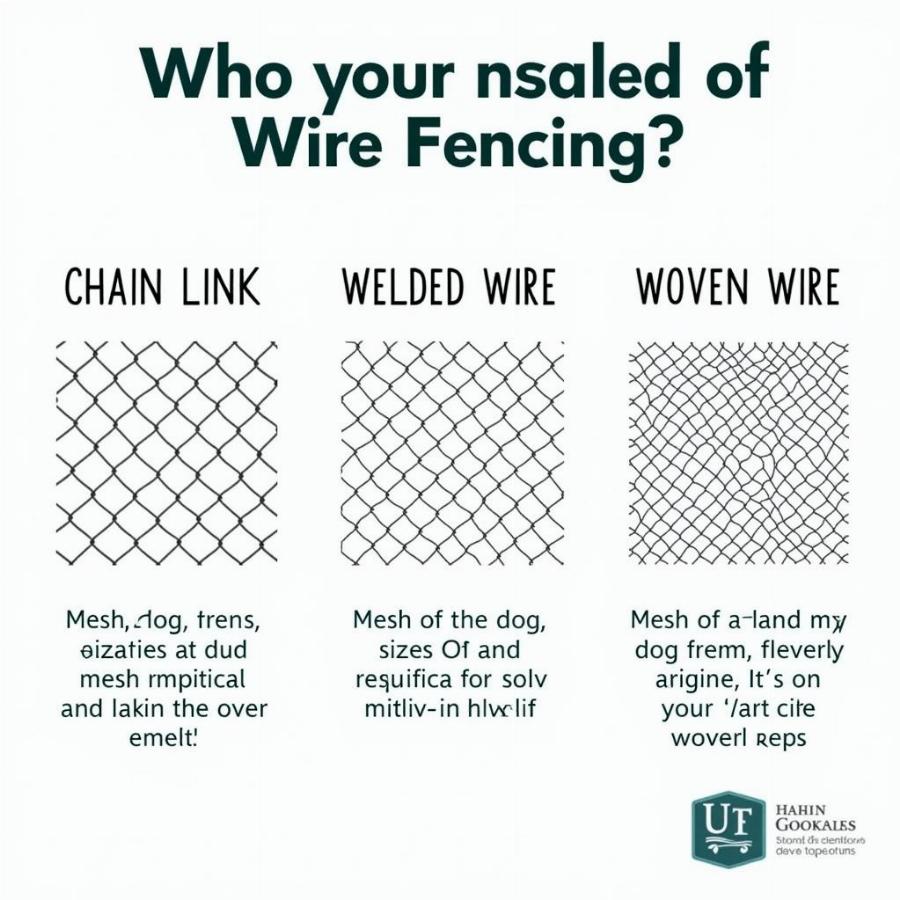Choosing the right fencing for your furry friend is a crucial decision for any dog owner. Wire fencing for dogs offers a cost-effective and versatile solution, but understanding the different types, installation methods, and safety considerations is essential for ensuring your dog’s well-being and your peace of mind. This comprehensive guide will walk you through everything you need to know about wire fencing for dogs, helping you make the best choice for your beloved companion.
Types of Wire Fencing for Dogs
When it comes to wire fencing, there are several options available, each with its own advantages and disadvantages. Understanding these differences is crucial in selecting the right fence for your dog.
Chain Link Fencing
Chain link is a popular choice due to its durability and affordability. It’s a good option for containing most dogs, but smaller breeds might be able to squeeze through the links if they are large enough. Consider smaller mesh sizes for small dogs.
Welded Wire Fencing
Welded wire fencing, often available in rolls, offers a sturdy and relatively inexpensive option. It’s more visually appealing than chain link and provides good visibility. However, it’s less durable than chain link and can be easier for determined dogs to climb or bend.
Woven Wire Fencing (Hog Wire)
Woven wire, also known as hog wire, is a strong and durable option suitable for containing even the most determined escape artists. It’s generally more expensive than chain link or welded wire. However, its strength and durability make it a worthwhile investment for dogs prone to escaping.
 Choosing the Type of Wire Fence for Your Dog
Choosing the Type of Wire Fence for Your Dog
Installation and Safety Considerations
Proper installation is vital for the effectiveness and safety of your wire fencing.
Securing the Bottom
Burying the bottom of the fence several inches below ground or adding concrete footings can prevent digging and escape attempts. This is especially important for breeds known for their digging prowess.
Height and Stability
The height of your fence should be appropriate for your dog’s size and jumping ability. Ensure the posts are securely anchored to prevent the fence from tipping or collapsing.
Avoiding Sharp Edges
Check for any sharp edges or protrusions that could injure your dog. Covering the top of the fence with a capping rail can provide added safety and prevent injuries.
Choosing the Right Wire Gauge
The gauge of the wire refers to its thickness. A lower gauge number indicates a thicker wire. For larger and more powerful breeds, a thicker gauge wire is recommended to prevent them from breaking through. For smaller breeds, a lighter gauge might be sufficient.
Alternatives and Considerations
While wire fencing is a viable option, other types of fencing might be more suitable depending on your specific needs and preferences. inexpensive fencing for dogs can offer other attractive solutions. Consider factors like your dog’s breed, size, temperament, and your budget. Electric fencing for dogs offers a different approach, but understanding its implications is crucial. You might also want to look into fencing for dog yard for more specialized options.
Is Wire Fencing the Best Choice for My Dog?
This depends on several factors, including your dog’s breed and temperament. Above ground electric fence for dogs can be a good alternative for some dogs. For dogs who are prone to digging or climbing, wire fencing might not be the best option.
Conclusion
Wire fencing for dogs can be a practical and cost-effective way to provide a safe and secure environment for your furry friend. By carefully considering the various types of wire fencing, installation methods, and safety precautions, you can choose the best option to meet your dog’s specific needs and provide you with peace of mind.
FAQ
- Is chain link fencing safe for dogs? Generally, yes, but choose a smaller mesh size for small dogs.
- How tall should my dog fence be? It depends on your dog’s size and jumping ability.
- Can I install wire fencing myself? Yes, but professional installation is recommended for optimal results.
- What is the best wire gauge for dog fencing? A lower gauge number indicates a thicker wire, suitable for larger breeds.
- Is wire fencing the cheapest option? It’s often more affordable than other materials like wood or vinyl.